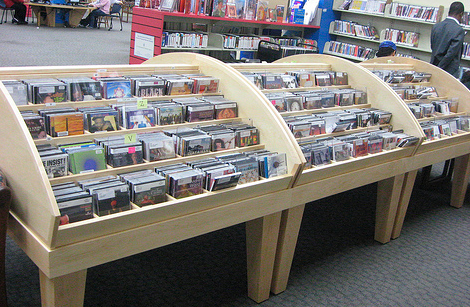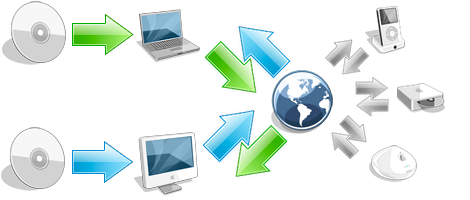Other
Legalizing p2p scheme: legally borrow music from the internets

"New CD browsers" on Flickr, by San Mateo County Library
Recently, a lot has been happening in the peer-2-peer space, at least from the legal perspective. The Pirate Bay trial, plus various torrent websites shutting down; TorrentFreak is an excellent news source for all that goodness. While a lot of people scream that RIAA/MPAA (and their international equivalents) are not keeping up with the times and technology, we are not really any closer to having an entertainment distribution system that takes advantage of available technology to make it convenient for consumers and one which fairly compensates the industry that creates the said content. So I propose starting a discussion, by presenting a scheme that pulls p2p technology and current copyright laws closer together.
There are two basic premises:
- Music is purchased as a license for an individual to indefinitely enjoy a particular piece of entertainment.
- It is permissible to lend someone a physical music CD, provided that it is original (such as store bought), and not a copy.
The latter point is what allows one to sell their used CDs (imagine that, there’s an actual business that does that, with 11 locations in Ontario — The Beat Goes On), borrow CDs from a public library (the Toronto Public Library has 59 838 titles (in multiple copies!) available), or to lend a CD to a friend (just try to outlaw that, and the general public will actually start taking interest in the application of copyright laws, and the next election).
The former point stipulates that a physical CD is simply a token, showing that the current holder has a license to enjoy the media; the recordings on the disk are simply a convenience factor.
So the natural step, at least as it seems to me, is to digitalize this license tokens, and let them be shared over p2p technology, as you would have shared a physical CD with a friend. Here’s what I have in mind:

Scheme illustration, put together with free icons from IconsPedia
All of the music is readily available for download (similar to current .torrent approach) and copies could be cached on your device (to save bandwidth), but it is not playable unless a license token is also available on the system. The license tokens will act as unique digital keys, which could be borrowed and released back into the cloud of p2p.
If one had purchased a set of license keys for the latest music album, but isn’t listening to this particular music items at the moment (school, work, sleep.. there are many reasons why ones entire music collection isn’t played 24/7), those keys are available to be given to someone else. Similarly, one could temporary take possession of someone else’s license, while such is available.
To prevent leechers, and make for a fairer sharing experience, a model similar of current private torrent trackers could be applied — those who contribute more keys will get priority status. Bonus points for contributing keys to high-demand or rare media. Maybe preference for own social graphs.
The net effect of automating request-play-release cycle is that a) sharing music will be completely legal, b) ease of use would be on par with current technology, and c) popular content (ones with more simultaneous key usages) will see a proportionally larger share of revenue. Just think back to days of mixtapes, and trading CDs with friends; except that it’s now done every 3 minute, through a wire, and you are friends with the world.
The caveat is that, yes, one would actually have to pay for some of the licenses to take part in this sharing community process. Though ones choice of which artists to support and generalizing the use of granted licenses should make it a fair deal. iTunes and Amazon’s MP3-Downloads show that a lot of people are still willing to pay for very specific music purchases online.
But now, given the fact that “pirates [are the] biggest music buyers”, via Ars, do we really have to implement such an explicit model?
Those who download “free” music from P2P networks are more likely to spend money on legit downloads than those who are squeaky clean, according to a new report out of Norway.






Interesting, Tony. Though, I can see where this can be exploited. Even if the restrictions were impossible to hack, think what could be set up with instantaneous transfering. One large playlist could service almost as many people as there are songs, as long as everyone is listening to a different song. Combine a few very large, overlapping playlists, and a person would be able to choose “avaiable” songs.
Now imagine that on a P2P scale. The client determines everyone with that has that particular song, and requests the licence from them. Once the song is done, the licence is sent back (or perhaps expires after 2x the songs length, and the original licence is reactivated after that same time).
Still legal according to your rules, but it doesn’t really solve the problem of people not paying for a song, and I don’t think the people who actually care about that would go for this. Though I do like the idea. I can just find any song – and if I don’t have it, download it automatically, and then play it.
Reply to comment
That’s less an exploit and more the point of the setup; one can listen to whatever they want, as long as nobody else does. Though you are right, there doesn’t need to be too many licenses out there, to sustain a reasonable number of users.
The underlying ideas were that the record industry didn’t seem to have a problem with anyone sharing their purchased CDs. Legally, this is the same (you and all your friends buy 1 unique CD and then trade with each other), but the technology eliminates a lot of waste. Waste of time to walk to the store/library. Waste of license potential, when the song isn’t played. That’s the only thing that has changed — exchange has became faster and more efficient.
If the record industry is basing their business model on a wasteful behaviour, and spends its efforts on fighting improvements in efficiency, over fixing their business; then it’s no wonder that the industry is in trouble.
Reply to comment
Eh, sounds like a good idea. However, I don’t see why we can’t just join those 15$ a month sites that allow us to listen to all the music we want. I mean, that should satisfy most of our needs and if enough people signed up for them, their catalogs would be really big.
Reply to comment
I guess it’s kind of similar, in a way that the subscription site chooses which licenses to add to its collection, on your behalf.
I’m not quite sure how such subscription sites work; my biggest concern would be taking the media for a longer period of time, such as for going offline and remote devices. Also, when you cancel your subscription, you are not left with anything to keep.
Reply to comment
of course you wouldnt keep anything (however some sites let you have 10 or so permanent downloads)
Reply to comment
People probably just use a free streaming media recorder
Reply to comment
Indeed, DRM is not enforceable. I tried WireTap and it is pretty amazing. Better yet, according to the Canadian Copyright Act, it is not a copyright infringement to create a copy of a sound recording, as long as it’s for private use and not for sale/rent/distribution. (Copyright Act C-42 Part 8, paragraph 80)
There might be some blanket “breaking of digital security system” legality for removing DRM out of a file, but to my interpretation recording a playing stream leaves the DRM intact.
Reply to comment
The music industry or even the government has to get a hold on this issue. The licensing idea might be the best idea i’ve heard so far. On one hand artists deserve to get compensated for their music, but on the other there has to be a way for the people at large to legally share music with one another. A small licensing fee would accomplish that.
Reply to comment
I don’t think the government or anybody can stop online piracy, as there is a new way always that can be used for piracy.
And i also agree that “pirates [are the] biggest music buyers”
Reply to comment
1
Reply to comment